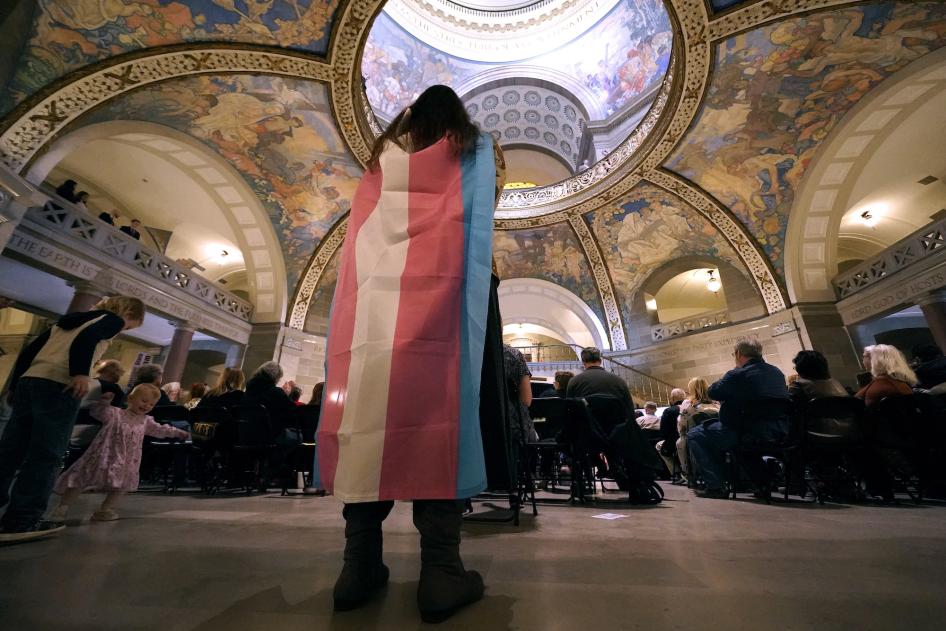In recent years, advocates have faced an unprecedented avalanche of anti-LGBTQ legislation each spring. In 2024, however, the onslaught seems to have faltered somewhat. While hundreds of anti-LGBTQ bills were once again introduced, as many state legislative sessions draw to a close, fewer bills have been enacted into law.
While that may seem like cause for celebration, it’s also cause for concern.
To be sure, the slowdown in anti-LGBTQ legislation is welcome. Beginning in 2020, legislation targeting transgender rights in particular had sailed through state legislatures, with the number and scope of hostile bills increasing each year. Unlike earlier years when one or two prominent anti-LGBTQ bills triggered a national pushback that often chastened lawmakers, hundreds of bills have been introduced during legislative sessions in the last four years, often with little debate or scrutiny, and dozens of them zealously passed into law.
Those bills do real damage when they are enacted, cutting LGBTQ people off from material benefits like health care and domestic violence shelters, recognition by the state, and equal participation in public life. Even when they fail to become law, they have devastating effects on the mental health of LGBTQ people, throwing their lives into disarray and sapping valuable time and energy from LGBTQ communities. This especially affects children, with more than 90 percent of LGBTQ young people in a recent Trevor Project survey reporting that politics had negatively affected their personal well-being.
But the recent slowdown, far from being a positive signal, may well reflect a growing indifference to the suffering of LGBTQ people that is now baked into the political and legal system. Opponents of LGBTQ rights have normalized hostile rhetoric and enacted draconian laws that seemed unthinkable just a couple of years ago, and even ardent supporters of equality find themselves unsure how they might reverse state laws that unapologetically strip away LGBTQ rights.
If anything, it has become apparent that the damage that has been done since 2020 will most likely reverberate for a generation, and the past year shows that restoring and advancing LGBTQ rights will be a painstaking endeavor.
And one sobering reason for the slowing pace of anti-LGBTQ legislation is that, at this point, many conservative states have already stripped away important rights, particularly for transgender children. As of 2024, half of the states in the U.S. prohibit transgender girls from playing school sports, and half have banned or criminalized at least some forms of medically indicated healthcare.
Put differently, lawmakers aren’t targeting some rights this year because they’ve already eviscerated them.
Yet even as the pace of legislation slows, critical rights continue to be stripped away. According to the ACLU, more than 30 anti-LGBTQ bills have been enacted in 2024 — fewer than the 84 enacted in 2023, but still far too many. Among them, Utah and Mississippi restricted transgender people from accessing bathrooms and locker rooms in public schools and other government buildings.
Lawmakers in Ohio overrode the governor’s veto to ban transgender children from receiving gender-affirming care or playing sports consistent with their gender identity. South Carolina and Wyoming similarly enacted blanket bans preventing transgender children from accessing gender-affirming care.
Many of the bills that have been introduced this year sought to expand existing anti-LGBTQ legislation in new ways. Alabama, for example, successfully expanded its bathroom ban from K-12 schools to colleges and universities. Even those that didn’t pass are in many cases likely to be reintroduced after the 2024 election, particularly if anti-LGBTQ lawmakers increase their showing in state legislatures or if governors who are supportive of LGBTQ rights are no longer positioned to veto hostile legislation.
In many states with anti-LGBTQ legislation, administrative and regulatory agencies are being used to curtail LGBTQ rights even further. Florida offers an instructive example. Even after years of anti-LGBTQ legislation, the Florida Department of Highway Safety and Motor Vehicles took things a step further within its mandate, and decided in 2024 that transgender people could no longer update the gender marker on their driver’s licenses. This echoes recent regulatory crackdowns elsewhere in the United States, from the Texas Department of Family and Protective Services investigating parental support for transgender children as child abuse to school boards across the country stripping away lifesaving resources in schools.
And while many believed that courts would provide a bulwark against discriminatory legislation and regulations, in part because of strong Supreme Court precedent to suggest that anti-transgender discrimination is a form of sex discrimination, that has not consistently been the case. Trial courts have largely found in favor of transgender litigants, criticizing the insufficient justification and discriminatory purpose of anti-transgender laws, but some appellate courts have nevertheless allowed the laws to take effect.
Perhaps most alarming, there are advocates and lawmakers who, if in a position to do so, are eager to carry out an even harsher attack on LGBTQ rights. Project 2025, which a group of conservative organizations has drafted as a roadmap for a second Trump administration, promises an even more draconian attack on LGBTQ rights. This would include rolling back existing nondiscrimination protections for LGBTQ people, reinstating the transgender military ban, and codifying state restrictions on transgender rights at the federal level, in addition to limiting recognition of same-sex relationships.
The anti-LGBTQ backlash may be waning in certain respects — but in other ways, it has only just begun. As we celebrate Pride, LGBTQ people and their allies should be mindful of the need to support those communities whose rights are being eroded, invest in transgender rights organizing, demand that lawmakers prioritize LGBTQ rights, and fight for the independent institutions and protections for basic freedoms that are essential to hold power to account.










